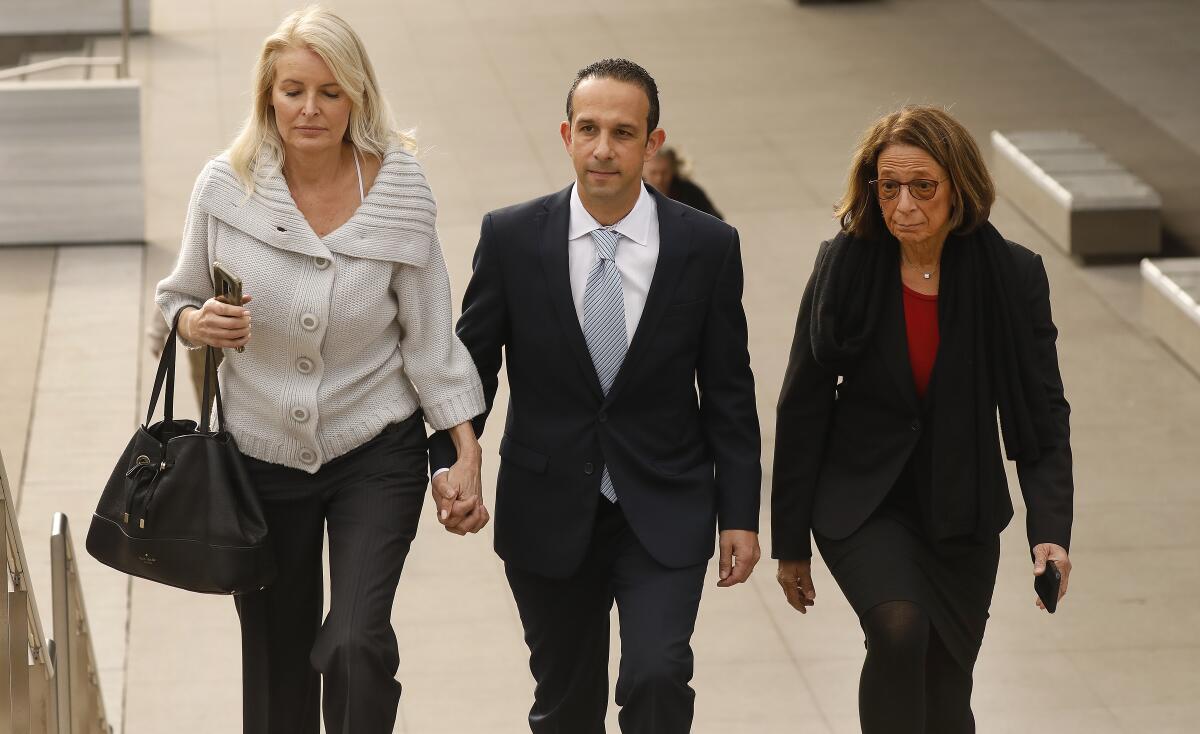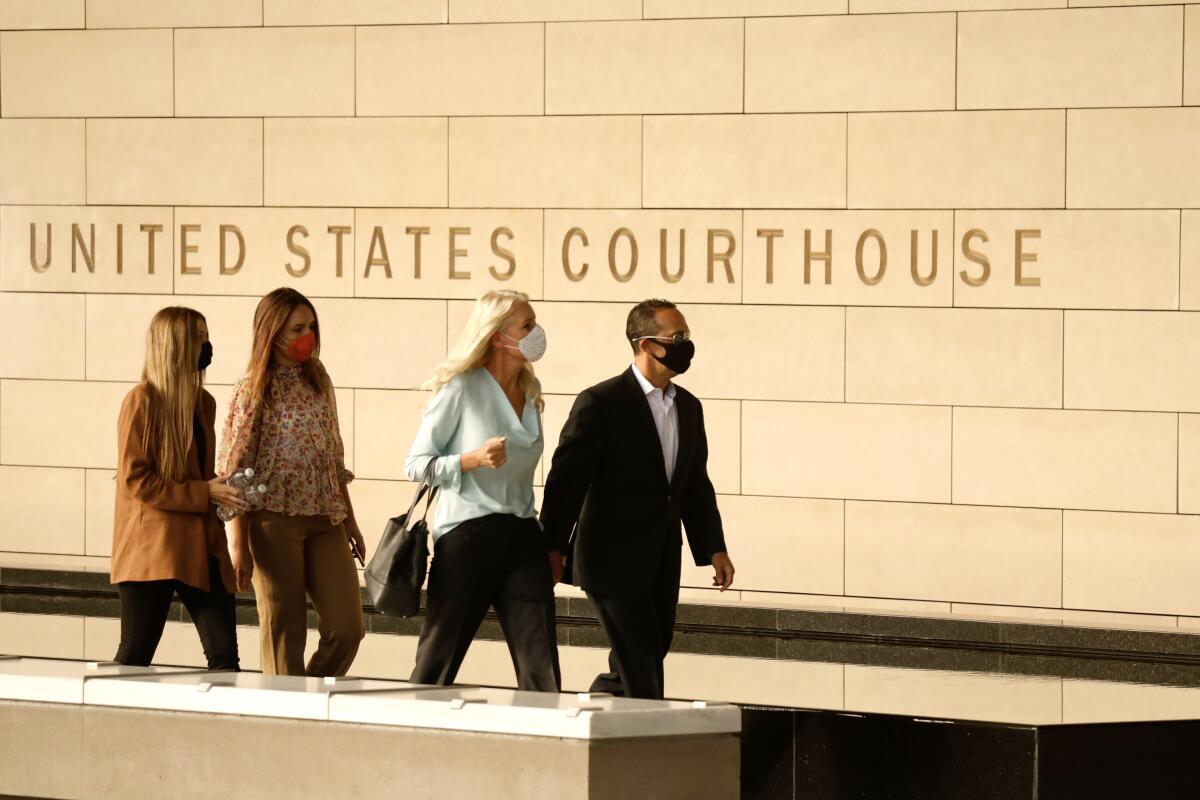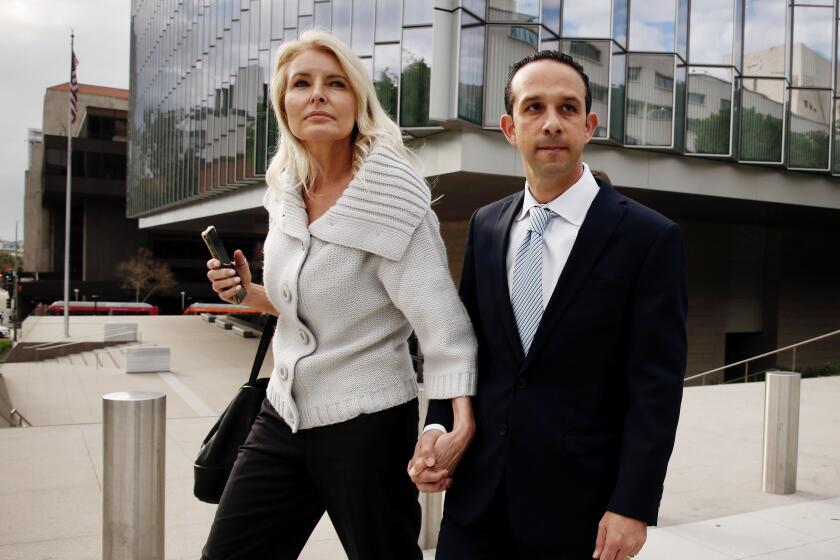An L.A. councilman lied to the FBI. Probation officials say he deserves no jail time

It was the first blockbuster case to surface in the federal corruption probe of Los Angeles City Hall — a multi-count indictment accusing former Councilman Mitchell Englander of taking envelopes of cash, lying to the FBI about that money and obstructing its investigation.
Englander, while serving in office, made false statements to FBI agents during three separate interviews, prosecutors said, providing untrue information about his dealings with a businessman who gave him $15,000 in two casino bathrooms.
The case was resolved quickly, with Englander pleading guilty to a single count of scheming to falsify material facts. But now, prosecutors are voicing objections to the sentence recommended by federal probation officials: three years’ probation, a $9,500 fine and no jail time or community service.
Such a mild sentence, prosecutors said, would represent a “two-tier system of justice,” showing that white-collar defendants receive more lenient treatment than other criminals.
Englander, they said, obstructed their investigation and violated two oaths — one he took as an elected official, the other as a reserve officer with the Los Angeles Police Department.
As L.A. officials battle the coronavirus pandemic, a corruption scandal has fueled mistrust in City Hall.
“Over numerous incidents of escalating corruption and self-preservation, [the] defendant sold out both oaths, cheaply and repeatedly,” they wrote.
Englander, 50, is scheduled to be sentenced on Jan. 25. Federal prosecutors have asked that he receive 24 months’ imprisonment, 300 hours of community service and a $45,000 fine — three times the amount he received in casino bathrooms in Las Vegas and near Palm Springs.

In federal prosecutions that end with a conviction or guilty plea, a probation officer prepares a report for the judge with a recommendation on how to apply sentencing guidelines to the circumstances of the case. The report reviews the nature of the criminal activity, the defendant’s background and other factors.
In paperwork filed this month, prosecutors argued that probation officials failed to take into account Englander’s many lies and attempts to obstruct justice.
Englander’s lawyer has vigorously defended the sentencing recommendation, saying it properly followed the law and the facts of the case — and is appropriate for a first-time offender who has shown remorse.
Englander has been a good father, a loving husband and dedicated community leader — someone who, until his trip to a Las Vegas casino, demonstrated “a lifetime of public service and law-abiding behavior,” wrote Janet I. Levine, his attorney in the case.
The councilman’s acceptance of envelopes of cash did not constitute bribery or even a federal crime, because Englander took no “official acts” in exchange for the money, Levine said. Prosecutors say the businessman made illicit payments to Englander and other public officials to expand his sales opportunities in L.A.
Englander’s false statements to the FBI “were designed to hide his own actions, which while embarrassing ... did not violate federal laws,” she said.
Englander, who served in office from 2011 to 2018, was the first public figure to be arrested in the sprawling corruption investigation, which focused on alleged bribes and financial benefits given by businessmen who needed help at City Hall with their multi-story construction projects.
Former Councilman Jose Huizar and former deputy mayor Raymond Chan have both been charged in the inquiry and entered not guilty pleas. Former Huizar aide George Esparza, who was with Englander on the 2017 Vegas trip, pleaded guilty last year to a federal racketeering charge.
In his plea agreement, Esparza admitted accepting monthly payments of $8,000 to $10,000 from the businessman who provided money to Englander. Esparza, Huizar’s special assistant, took the money in exchange for helping to arrange meetings between the businessman, who was selling home tech products, and real estate developers, prosecutors said.
After the FBI opened its investigation, the businessman began working with investigators, recording his conversations with Englander and providing agents images of the messages he received from Englander on Confide, a disappearing-message app.
The felony that Englander admitted committing, participating in a scheme to lie to federal authorities about facts material to a criminal investigation, carries a maximum penalty of five years in prison and a $250,000 fine.
Under the plea agreement, prosecutors agreed to seek no more than three years.
In the weeks leading up to his sentencing, Englander has submitted pleas for leniency from dozens of friends, family members and former colleagues in the LAPD reserve program and elsewhere.
Former Councilman Ed Reyes said Englander should be kept out of prison so that he can promote positive messages to young people experiencing difficulties during the coronavirus pandemic.
“He would be much more productive engaging community service than being in a cell,” Reyes wrote.
Councilman Kevin De León will introduce a range of motions Tuesday with the goal creating 25,000 new housing units for homeless people by 2025
Lobbyist Arnie Berghoff praised Englander for his work with the Los Angeles Political Roast, which raises money for the American Diabetes Assn. He also described the former councilman as ashamed and “deeply remorseful.”
“Mitch understands the severity of what he did, and a sentence of probation, a fine, and the performance of community service would most benefit society, his loving family and Mitch,” he wrote.
Prosecutors have painted a darker picture of the former councilman, saying he carried out a “pattern of coolly calculated criminality.” On multiple occasions, Englander instructed the businessman who had given him cash to lie to FBI agents and conceal information from them — activities he acknowledged in his plea agreement.
“Far from isolated, defendant’s obstructionist conduct was pervasive, persistent, and plainly designed to thwart a criminal investigation rapidly closing in on him,” they wrote.
During one meeting, prosecutors said, Englander turned up the volume of music in his car, in hopes of making it difficult for any surveillance device to capture the conversation.
Englander’s actions have caused “lasting civic damage,” undermining the public’s trust in the city government, prosecutors said. As a result, they said, his actions warrant a “meaningful term of imprisonment.”
More to Read
Sign up for Essential California
The most important California stories and recommendations in your inbox every morning.
You may occasionally receive promotional content from the Los Angeles Times.













